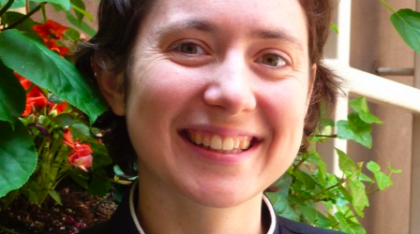One might consider Anne an expert sculptor as much as a gastronome, as she mindfully created her own career path with the tools that she had available. Determined to combine both her passion (for sustainable living) with her profession (working with food), Anne's held a series of jobs that are off the beaten path from a strictly "chef" position. You can find her now in the heart of the Northeast Kingdom of Vermont, guiding the students at Sterling College to do the same: think more creatively about how they can change the world.
What attracted you to a good food job?
The food industry is the most delicious industry, of course! And the sustainable food world is a highly delicious and rewarding place to work: aesthetically, ethically, and in terms of the connections you get to make with the ecological system in which you live. Working at Sterling College allows me to not only practice my skills, but share what I know, too, and also to be a part of the community I work to nourish. This genuine community connection is rare in the fast-paced and disconnected restaurant industry.
How did you get your current good food job?
I saw a press release about the creation of the Director of Sustainable Food Systems position at Sterling College that was posted on the email list COMFOOD. COMFOOD is a server sponsored by the Community Food Security Coalition, where discussions, announcements, questions, etc. are posted by people interested in food sustainability and access. This position is essentially my dream job, so I took a day off of work to prepare my application, and put everything I had into convincing the hiring committee I was the perfect person for the job.
How did your previous work or life experience prepare you for a good food job?
My job is incredibly complex, and requires me to apply a vast array of skills every day. My work experience on farms helps me understand seasonality in my planning and how to work with farmers. My experience teaching helps me plan for the exciting summer program I'm leading the development of, called "Vermont's Table: Farming, Cooking and the Rural Experience." My experience cooking - in restaurants, institutions and at home - and my degree from the Culinary Institute of America, help me to develop menus and manage the kitchen. My Master's degree in Agriculture, Food and Environment is relevant in everything from academic programmatic development to menu planning and being the faculty sponsor of various student projects.
What advice do you have for others in search of a good food job?
Finding a good food job isn't like becoming a doctor or a teacher. There's no pre-set path, and sometimes it can be frustrating trying to figure out what to do next. My advice is to get a lot of experience, even if it isn't in the perfect job or even paid. Learn more about the sector you're interested in by diving in. Work a job, volunteer, go to conferences, and - most importantly - meet people. Once you're in the sustainable food world, you're much more likely to catch the jobs that do come along or find opportunities to create your own!
If you could be compensated for your work with something other than money, what would it be?
This question makes me laugh because most people who work in sustainable food are compensated - at least partially - by something other than money. Sure, I get paid to do my job, but I could have a much higher monetary income using my skills to do something else. As corny as it sounds, what motivates me to take the harder and less lucrative path is the joy I find in working towards a more balanced natural system in my tiny part of the world - one that nourishes the community and our ecological landscape. I'm also rewarded by the opportunity to help Sterling College students along the paths that will carry the shift towards a sustainable food system beyond northern Vermont to our broader human community.









